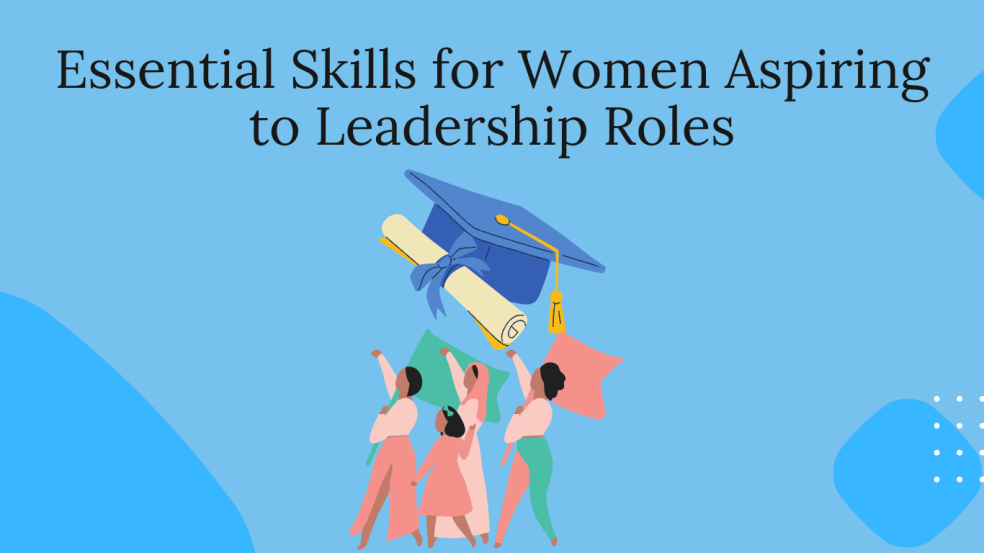
Essential Skills for Women Aspiring to Leadership Roles
In every aspect of society, including leadership, women are rewriting the rules. From community organizers to CEOs of Fortune 500 companies, women are showcasing their amazing ability to lead, inspire, and drive positive change in a range of roles. But there can be differences on the road to becoming a powerful female leader, and each has her own obstacles to overcome.
This blog is designed to empower you on this journey by outlining the essential skills for women aspiring to leadership roles. We’ll look at ways to build the self-assurance, communication skills, and strategic thinking that are essential for success at the top.
Why Women Make Great Leaders
Diversity in leadership is no longer a "feel-good" initiative; it's a sound business strategy. According to McKinsey & Company studies, businesses with more women in leadership roles are 21% more likely to achieve above-average profitability and are 21% more profitable overall. This is because women bring a unique perspective and skillset to the table, often excelling in areas like:
- Communication: Women are renowned for having excellent communication abilities, which promote teamwork and the development of trust.
- Empathy: The workplace is more positive and inviting because women make more empathetic leaders.
- Building Strong Relationships: Women often excel at building strong relationships with colleagues, clients, and stakeholders.
- Collaborative Leadership: Women often embrace a collaborative leadership style, which can lead to more creative solutions and buy-in from team members.
These qualities, particularly when combined with astute strategic thinking and decision-making skills, make women excellent leaders.
Essential Skills for Aspiring Women Leaders
Now that the "why" of women's leadership potential has been proven, let's explore the "how." The following are important areas to concentrate on while you hone your leadership abilities:
Confidence
Solid leadership is built on self-belief in oneself and one's talents. Here are a few strategies for developing confidence:
- Challenge Self-Doubt: Identify your self-doubting thoughts and challenge them with evidence of your skills and accomplishments.
- Celebrate Achievements: Take the time to acknowledge your successes, both big and small.
- Step Outside Your Comfort Zone: You can volunteer for challenging projects or presentations. Stepping outside your comfort zone can be a powerful confidence booster.
Communication
To motivate and inspire your staff, effective communication is crucial. This includes:
- Clear and Concise Verbal Communication: Express your ideas and instructions in a way that is easy for others to understand.
- Strong Written Communication Skills: Have the ability to communicate effectively and convincingly in emails, reports, and presentations.
- Active Listening: Pay attention to what others are saying, both verbally and nonverbally.
Strategic Thinking
Great leaders can see the big picture and develop strategies to achieve long-term goals. Here's how to hone your strategic thinking:
- Think Critically: Examine situations from several angles, taking into account any possible effects.
- Analyze Data: Learn to interpret data and use it to inform your decisions.
- Develop Long-Term Vision: Craft a clear vision for your team or organization and create a roadmap to achieve it.
Decision-Making
Effective leaders must be able to assess possibilities, make snap decisions, and take responsibility for the results. These following advices can help you make wise decisions:
- Gather Information: Don't make decisions in a vacuum. Gather data, consult with others, and weigh all available options.
- Consider the Wider Impact: Think about the potential consequences of your decisions on all stakeholders.
- Be Decisive: While it's important to gather information, don't be afraid to make a choice and move forward.
- Learn from Both Successes and Failures: All choices present chances for learning. Evaluate what worked and what has to be done better the next time.
Negotiation
To secure resources, come to win-win agreements, and stand up for yourself and your team, you need strong negotiation abilities. Here are some tips for becoming a skilled negotiator:
- Do Your Research: Before entering any negotiation, understand your goals, the other party's needs, and your BATNA (Best Alternative To a Negotiated Agreement).
- Practice Active Listening: Pay attention to the other party's wants and needs to find common ground.
- Be Clear About Your Value: Make sure to express the value you bring to the table, and be ready to leave if needed.
Focus on Building Relationships
The goal of negotiation is to establish solid, mutually beneficial partnerships rather than just come out on top.
Work-Life Balance
Women often face unique challenges in balancing work and personal life. Here are some strategies to find work-life balance:
- Set Boundaries: When it comes to extra work or commitments, learn to say no.
- Prioritize Self-Care: Schedule time for activities that help you relax and recharge, such as exercise, spending time with loved ones, or pursuing hobbies.
- Seek Support: Don't be afraid to ask for help from your partner, family, or a reliable childcare provider.
Developing Your Leadership Qualities
Now that you are aware of the necessary abilities of prospective female leaders, here are some concrete actions you can take to enhance them:
- Seek Mentorship: It can be really helpful to find a female leader that you respect. Seek someone who is willing to share their experiences, provide advice, and offer support.
- Network: It is essential to establish solid professional contacts with other experts in your sector. Participate in conferences, join trade associations, or make connections on LinkedIn.
- Take on Leadership Roles: Offer yourself for a leadership role in your business or local associations. You'll gain useful experience doing this and be able to show off your abilities to others.
- Continue Learning: Never stop learning and developing your skillset. Peruse literature on leadership, enroll in virtual classes, or visit seminars centered around dialogue, compromise, or tactical analysis.
- Embrace a Growth Mindset: View challenges as opportunities to learn and grow. Make yourself open to feedback and willing to adapt your approach.
Owning Your Power: Leading with Confidence
As a female striving for leadership, never forget that you are not by yourself. A large and encouraging group of women who have led the road are available to encourage you. By focusing on the essential skills listed above and actively developing your leadership qualities, you may overcome any obstacles and achieve your goals. Here are some additional tips for leading with confidence:
- Find Your Authentic Leadership Style: No one can lead with a style that suits them all. Assess your strengths and develop a leadership style that suits you.
- Embrace Your Voice: Never afraid to speak up and share your ideas. Your unique perspective is valuable.
- Empower Others: Good leaders improve people around them. You can encourage collaboration and diversity by serving as a mentor and lending a hand to others in your immediate vicinity.
- Celebrate Your Achievements: Take pride in your accomplishments, both big and small. You deserve to celebrate your successes.
Conclusion
Keep in mind that becoming a leader is a process rather than a final goal. There will inevitably be roadblocks and setbacks. However, you can take control of your future and develop into the extraordinary leader you were destined to be by remaining committed, honing your abilities, and having faith in yourself.

















